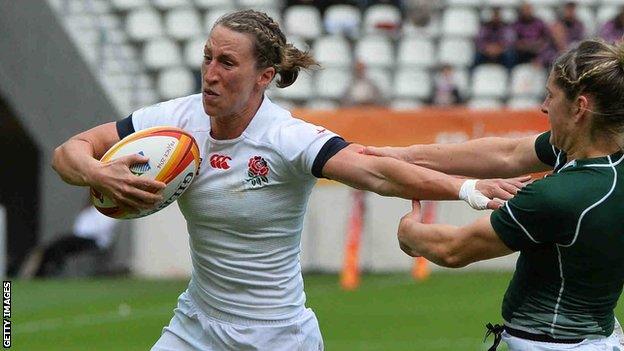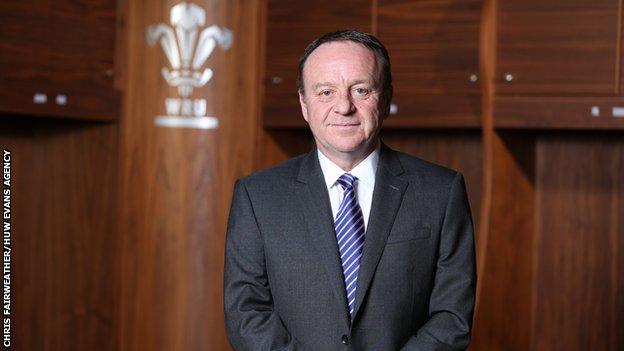'Say brain damage, not concussion' - ex-Wales wing Caryl James wants greater awareness of head injuries
- Published

Former Wales wing Caryl James made her Six Nations debut in 2010
Former Wales wing Caryl James awareness of the effects of head injuries on players must be raised.
James was speaking after learning of former England opponent Kat Merchant's plight and as the subject of long-term brain damage has hit the sporting headlines.
Merchant says rugby has left her with "lower cognitive capacity".
James said: "It's a very sad situation and more has to be done to stop this, and to protect players in the future."
Merchant and James played against each other at women's international level before they retired in 2014.
James has since gone on to pass Welsh Rugby Union (WRU) level two coaching qualifications.
That process has led James to become far more aware of concussion, with her telling BBC Radio Cymru that she was not aware of the dangers while playing.
James was asked if there was enough information available during her playing career and if the situation has changed since she retired.
She replied: "No. Definitely not. I was not aware of the effects of concussion at all [while playing]. People use that word so easily, freely.
"If people were to say 'brain damage', I think it'd hit people harder, make them realise you're damaging your brain, the most key organ in your body, and you only have one and you can't get a new one.
"I do think there's more awareness now, and there are great facilities on the Welsh Rugby Union's website, under the '[WRU Game] Locker'.
"But I know where they are. I'm aware of these because I coach at level two, I've been trained.
"I have been on the courses and have my qualifications, but the big question is how many people know these are available and use them?
"So much more needs to be done to raise awareness in that way."
After learning of Merchant's post-rugby experiences and with legal action expected to be brought against the sport's authorities by former internationals including Alix Popham and Steve Thompson, James said: "It's a very serious situation, and the recent stories are extremely sad.

Kat Merchant won the 2014 Rugby World Cup with England
"To hear former players are suffering after playing a game they loved for so many years [is so sad] - I retired the same time as Kat Merchant - she was on the wing for England and I'd face her on the opposite wing for Wales, so I know Kat very well.
"The type of player she was, she ran straight at you and ran hard.
"She wasn't one to avoid contact - she went straight in, ran over you, ran over your head. That was her intention.
"And it's very sad to hear that she's still suffering from headaches, can't focus [see] clearly, and suffers from anxiety.
"It's a very sad situation and more has to be done to stop this, and to protect players in the future."
'No time for rugby to go missing'
Addressing the general issue of concussion, the Welsh Rugby Union (WRU) says they take the well-being of all players very seriously after it emerged Popham had been diagnosed with early onset dementia.
"All of Welsh rugby was saddened to hear news from the former international Alix Popham, of the health problems he is experiencing in retirement," said WRU chief executive Steve Phillips.
"We have made contact with the WRPA as we would with any player welfare matter, and we are aware they are in direct contact with Alix.

Steve Phillips has worked at the Welsh Rugby Union since 2007
"I would like to express my personal admiration for Alix and his family, for raising the issue and suggesting possible improvements to our game.
"More generally speaking, I would also add that we take the wellbeing of all players, including our former players, very seriously.
"We will always listen to, as the game has always done, any potential improvements to our game for any reason. This is certainly not a time for rugby to go missing."
The Rugby Football Union told the BBC: "The RFU takes player welfare incredibly seriously. As a result of our focus in welfare and specifically concussion, we have been able to develop our approach to concussion surveillance, concussion education, concussion management and concussion prevention across the whole game.
"The introduction of the Premier 15s three years ago and the 28 full-time England contracts has allowed us to improve concussion surveillance, education and management specifically within the women's game.
"We will continue to work with World Rugby and external academic institutions and other sports to develop targeted research programmes across all areas of the game."